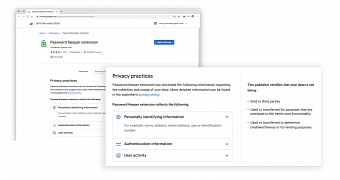Extensions have become an essential part of the experience with modern browsers, and Google Chrome is the living proof in this regard.
The Chrome Web Store has grown so much it’s now one of the first go-to places for those who installed Google Chrome, and the living proof in this regard is the number of downloads that some of the most popular extensions actually recorded.
But as many learned the hard way, extensions themselves can pose a threat to your data, especially because some can read all the information that you load in the browser, and this sometimes includes sensitive details.
Because of this approach, Google has decided to roll out a new privacy requirement for developers, making it mandatory for each extension to come with clear information on the data that is collected when installed in the browser.
“Starting January 2021, each extension’s detail page in the Chrome Web Store will show developer-provided information about the data collected by the extension, in clear and easy to understand language. Data disclosure collection is available to developers today,” Google explains.
Google has also announced that extensions will be subject to a new policy that will limit how developers can use the data they collect through their add-ons. Google explains:
- Ensuring the use or transfer of user data is for the primary benefit of the user and in accordance with the stated purpose of the extension.
- Reiterating that the sale of user data is never allowed. Google does not sell user data and extension developers may not do this either.
- Prohibiting the use or transfer of user data for personalized advertising.
- Prohibiting the use or transfer of user data for creditworthiness or any form of lending qualification and to data brokers or other information resellers.
The Chrome Web Store page of each extension will include additional information under a privacy practices screen, and developers will be required to publish the data as soon as possible.
The devs can already start updating the privacy information today, with the section to go live on the Chrome Web Store in mid-January. After this date, extensions that won’t be updated with privacy info would come with a warning that the dev hasn’t included such information.
“Data disclosures collection will be made available to developers today, and will be displayed on the Chrome Web Store listing starting January 18, 2021. For developers who have not yet provided privacy disclosures by January 18, 2021, a notice will be shown on their Chrome Web Store listings to inform users that the developer hasn’t certified that they comply with the Limited Use policy yet,” Google explains.
While Google Chrome users are the ones that will benefit from this change, those running other Chroming-powered browsers will also see the privacy information. Including Microsoft Edge, that is, as the new browser is running on the same engine as Google Chrome.
Microsoft Edge is offered as the default browser on Windows 10, but thanks to the migration to Chromium, it’s now available on more platforms, including Windows 7, Windows 8, Windows 8.1, macOS, and Linux. Of course, it also comes with support for extensions published in the Chrome Web Store, though Microsoft is also offering its very own add-on store where users are supposed to find only high-quality validated extensions.
Other Chromium browsers that can install extensions from the Chrome Web Store are Opera and Vivaldi. While Google Chrome is the world’s number one desktop browser, the runner-up is Microsoft Edge, while Vivaldi and Opera account for a smaller market share.

 14 DAY TRIAL //
14 DAY TRIAL //